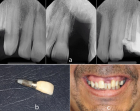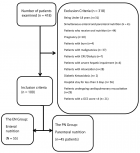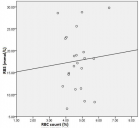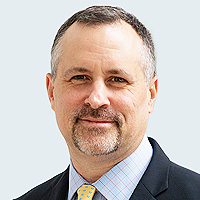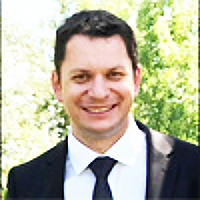Abstract
Retrospective Study
Outcome of Outpatient Autologous Hematopoietic Stem Cell Transplantation in Patients with Multiple Myeloma and Relapsed and Refractory Hodgkin Lymphoma. The Experience of King Fahad Specialist Hospital in Dammam, Saudi Arabia
Khalid Ahmed Al-Anazi*, Alshami A, Mutahar E, Abduljalil O, Kanfer S, Kaloyannidis P, Bacal J, Estanislao A, Apostolidis I, Almokhtar N, Darweesh M, Abdulbaqi M, Alenazi W, Alshammasi Z, Albanyan O, Ayyad A, Alsomali Z, Albatran M, Raslan H, Albahrani A, Alsaber A, AlMulhem N, Dridi W, Alrabeh R, Abu Rahma F, Nightingale F, Ahadai P and Alhashmi H
Published: 08 March, 2023 | Volume 7 - Issue 1 | Pages: 003-015
Background: Autologous hematopoietic stem cell transplants (HSCT) is the standard of care for transplant-eligible patients with newly diagnosed multiple myeloma (MM) and patients with relapsed and refractory Hodgkin lymphoma (R/R-HL) who achieve chemosensitivity after salvage therapy. Although autologous HSCT is routinely performed in an inpatient setting, the procedure can safely be performed in an outpatient setting.
Methods and materials: A retrospective study of patients with MM and R/R- HL who received outpatient autologous HSCT at King Fahad Specialist Hospital (KFSH) in Dammam, Saudi Arabia between the first of April 2017 and the 31st of January 2022 was performed.
Results: Over the study period of 4 years and 10 months, a total of 90 outpatient autologous HSCTs were performed for 79 patients (54 patients with MM; 4 of them received planned tandem autografts and 7 other myeloma patients received second autologous HSCTs for relapsed or progressive disease; and 25 patients with R/R-HL) at our institution. The median ages of patients with MM and those with R/R-HL at HSCT were 50.4 years and 27.8 years respectively.
At the presentation of their MM, the following high-risk (HR) features were encountered: stage II and III diseases according to the revised international scoring system (RISS) in 53.7%; adverse cytogenetics in 42.6% and extensive bone involvement in 53.7% of patients. In patients with HL at presentation, 48% of patients had stage IV disease according to Ann Arbor staging classification and 84% of patients had B symptoms.
Survival for 100 days post-HSCT for all patients with MM and HL who received outpatient autologous transplants was 100%. For patients with MM, the overall survival (OS) rates at 3 years and 4 years post-HSCT were 80% and 67%, while the progression-free survival (PFS) rates over 3 years and 4 years were 58% and 38% respectively. For patients with HL, the OS at 6 years post-HSCT was 95% while the PFS rates at 3 years and 6 years post-HSCT were 84% and 62% respectively.
Conclusion: Outpatient autologous HSCT for patients with MM and HL is safe, and feasible and can lead to short-term as well as long-term outcomes that are comparable to autologous transplantation performed in an inpatient setting. Additional benefits of outpatient autologous include saving beds and reducing hospital costs.
Read Full Article HTML DOI: 10.29328/journal.jsctt.1001030 Cite this Article Read Full Article PDF
Keywords:
Multiple myeloma; Hodgkin lymphoma; Autologous hematopoietic stem cell transplantation; Non-cryopreservation; Outpatient transplantation
References
- Ozaki S, Shimizu K. Autologous stem cell transplantation in elderly patients with multiple myeloma: past, present, and future. Biomed Res Int. 2014;2014:394792. doi: 10.1155/2014/394792. Epub 2014 Feb 20. PMID: 24719860; PMCID: PMC3956410.
- Małecki B, Gil L, Dytfeld D. Role of transplantation in treatment of multiple myeloma in era of novel agents. Acta Haematol Pol. 2021; 52(2): 77-84. doi: 5603/AHP.2021.0013.
- Al-Anazi KA. Autologous Hematopoietic Stem Cell Transplantation for Multiple Myeloma without Cryopreservation. Bone Marrow Res. 2012;2012:917361. doi: 10.1155/2012/917361. Epub 2012 May 28. PMID: 22693672; PMCID: PMC3368160.
- Du J, Zhuang J. Major advances in the treatment of multiple myeloma in American Society of Hematology annual meeting 2020. Chronic Dis Transl Med. 2021 Aug 31;7(4):220-226. doi: 10.1016/j.cdtm.2021.08.003. PMID: 34786541; PMCID: PMC8579022.
- Charliński G, Jurczyszyn Multiple myeloma - 2020 update on diagnosis and management. NOWOTWORY J Oncol. 2020; 70: 85-91.
- Gerecke C, Fuhrmann S, Strifler S, Schmidt-Hieber M, Einsele H, Knop S. The Diagnosis and Treatment of Multiple Myeloma. Dtsch Arztebl Int. 2016 Jul 11;113(27-28):470-6. doi: 10.3238/arztebl.2016.0470. PMID: 27476706; PMCID: PMC4973001.
- Al-Anazi K. Hematopoietic stem cell transplantation in multiple myeloma in the era of novel therapies. In: Update on Multiple Myeloma. Edited by Khalid Al-Anazi. London, Intech 2018. doi: 10.5772/intechopen. 79999
- Parrondo RD, Ailawadhi S, Sher T, Chanan-Khan AA, Roy V. Autologous Stem-Cell Transplantation for Multiple Myeloma in the Era of Novel Therapies. JCO Oncol Pract. 2020 Feb;16(2):56-66. doi: 10.1200/JOP.19.00335. PMID: 32045556.
- Gonsalves WI, Buadi FK, Ailawadhi S, Bergsagel PL, Chanan Khan AA, Dingli D, Dispenzieri A, Fonseca R, Hayman SR, Kapoor P, Kourelis TV, Lacy MQ, Larsen JT, Muchtar E, Reeder CB, Sher T, Stewart AK, Warsame R, Go RS, Kyle RA, Leung N, Lin Y, Lust JA, Russell SJ, Zeldenrust SR, Fonder AL, Hwa YL, Hobbs MA, Mayo AA, Hogan WJ, Rajkumar SV, Kumar SK, Gertz MA, Roy V. Utilization of hematopoietic stem cell transplantation for the treatment of multiple myeloma: a Mayo Stratification of Myeloma and Risk-Adapted Therapy (mSMART) consensus statement. Bone Marrow Transplant. 2019 Mar;54(3):353-367. doi: 10.1038/s41409-018-0264-8. Epub 2018 Jul 9. PMID: 29988062; PMCID: PMC6463224.
- Bazarbachi AH, Al Hamed R, Malard F, Bazarbachi A, Harousseau JL, Mohty M. Induction therapy prior to autologous stem cell transplantation (ASCT) in newly diagnosed multiple myeloma: an update. Blood Cancer J. 2022 Mar 28;12(3):47. doi: 10.1038/s41408-022-00645-1. PMID: 35347107; PMCID: PMC8960754.
- Rajkumar SV. Multiple myeloma: 2020 update on diagnosis, risk-stratification and management. Am J Hematol. 2020 May;95(5):548-567. doi: 10.1002/ajh.25791. Erratum in: Am J Hematol. 2020 Nov;95(11):1444. PMID: 32212178.
- Offidani M, Corvatta L, Morè S, Nappi D, Martinelli G, Olivieri A, Cerchione C. Daratumumab for the Management of Newly Diagnosed and Relapsed/Refractory Multiple Myeloma: Current and Emerging Treatments. Front Oncol. 2021 Feb 17;10:624661. doi: 10.3389/fonc.2020.624661. PMID: 33680948; PMCID: PMC7928404.
- Al Hamed R, Bazarbachi AH, Malard F, Harousseau JL, Mohty M. Current status of autologous stem cell transplantation for multiple myeloma. Blood Cancer J. 2019 Apr 8;9(4):44. doi: 10.1038/s41408-019-0205-9. PMID: 30962422; PMCID: PMC6453900.
- Nishida H. Rapid Progress in Immunotherapies for Multiple Myeloma: An Updated Comprehensive Review. Cancers (Basel). 2021 May 31;13(11):2712. doi: 10.3390/cancers13112712. PMID: 34072645; PMCID: PMC8198014.
- Swamydas M, Murphy EV, Ignatz-Hoover JJ, Malek E, Driscoll JJ. Deciphering mechanisms of immune escape to inform immunotherapeutic strategies in multiple myeloma. J Hematol Oncol. 2022 Feb 16;15(1):17. doi: 10.1186/s13045-022-01234-2. PMID: 35172851; PMCID: PMC8848665.
- Voorhees TJ, Beaven AW. Therapeutic Updates for Relapsed and Refractory Classical Hodgkin Lymphoma. Cancers (Basel). 2020 Oct 8;12(10):2887. doi: 10.3390/cancers12102887. PMID: 33050054; PMCID: PMC7601361.
- Ansell SM. Hodgkin lymphoma: A 2020 update on diagnosis, risk-stratification, and management. Am J Hematol. 2020 Aug;95(8):978-989. doi: 10.1002/ajh.25856. Epub 2020 Jun 8. PMID: 32384177.
- Momotow J, Borchmann S, Eichenauer DA, Engert A, Sasse S. Hodgkin Lymphoma-Review on Pathogenesis, Diagnosis, Current and Future Treatment Approaches for Adult Patients. J Clin Med. 2021 Mar 8;10(5):1125. doi: 10.3390/jcm10051125. PMID: 33800409; PMCID: PMC7962816.
- Rybka J, Wróbel Treatment of Hodgkin lymphoma relapse after autologous hematopoietic cell transplantation. Acta Haematol Pol. 2021; 52(4): 309-313. DOI: 10.5603/AHP.2021.0059
- Majhail NS, Weisdorf DJ, Defor TE, Miller JS, McGlave PB, Slungaard A, Arora M, Ramsay NK, Orchard PJ, MacMillan ML, Burns LJ. Long-term results of autologous stem cell transplantation for primary refractory or relapsed Hodgkin's lymphoma. Biol Blood Marrow Transplant. 2006 Oct;12(10):1065-72. doi: 10.1016/j.bbmt.2006.06.006. PMID: 17084370.
- Iqbal N, Kumar L, Iqbal N. Update on salvage options in relapsed/refractory hodgkin lymphoma after autotransplant. ISRN Oncol. 2014 Mar 30;2014:605691. doi: 10.1155/2014/605691. PMID: 25006506; PMCID: PMC4003874.
- Al-Juhaishi T, Borogovac A, Ibrahimi S, Wieduwilt M, Ahmed S. Reappraising the Role of Allogeneic Hematopoietic Stem Cell Transplantation in Relapsed and Refractory Hodgkin's Lymphoma: Recent Advances and Outcomes. J Pers Med. 2022 Jan 18;12(2):125. doi: 10.3390/jpm12020125. PMID: 35207613; PMCID: PMC8880200.
- Spinner MA, Advani RH, Connors JM, Azzi J, Diefenbach C. New Treatment Algorithms in Hodgkin Lymphoma: Too Much or Too Little? Am Soc Clin Oncol Educ Book. 2018 May 23;38:626-636. doi: 10.1200/EDBK_200679. PMID: 30231319.
- Blum KA. Controversies in the management of early-stage Hodgkin lymphoma. Hematology Am Soc Hematol Educ Program. 2021 Dec 10;2021(1):234-239. doi: 10.1182/hematology.2021000255. PMID: 34889367; PMCID: PMC8791127.
- Wali R, Saeed H, Patrus N, Javed S, Khan SJ. Outcomes of Refractory and Relapsed Hodgkin Lymphoma With Autologous Stem-Cell Transplantation: A Single Institution Experience. J Glob Oncol. 2019 Nov;5:1-6. doi: 10.1200/JGO.19.00051. PMID: 31756138; PMCID: PMC6882513.
- Ishizawa K, Yanai T. Hematopoietic Stem Cell Transplantation and Brentuximab Vedotin for Patients with Relapsed or Refractory Hodgkin Lymphoma and Systemic Anaplastic Large-Cell Lymphoma. Adv Ther. 2019 Oct;36(10):2679-2696. doi: 10.1007/s12325-019-01046-w. Epub 2019 Aug 7. PMID: 31392578; PMCID: PMC6822829.
- Merryman RW, Redd RA, Nishihori T, Chavez J, Nieto Y, Darrah JM, Rao U, Byrne MT, Bond DA, Maddocks KJ, Spinner MA, Advani RH, Ballard HJ, Svoboda J, Singh AK, McGuirk JP, Modi D, Ramchandren R, Romancik J, Cohen JB, Frigault MJ, Chen YB, Serritella AV, Kline J, Ansell S, Nathan S, Rahimian M, Joyce RM, Shah M, David KA, Park S, Beaven AW, Habib A, Bachanova V, Nakhoda S, Khan N, Lynch RC, Smith SD, Ho VT, LaCasce A, Armand P, Herrera AF. Autologous stem cell transplantation after anti-PD-1 therapy for multiply relapsed or refractory Hodgkin lymphoma. Blood Adv. 2021 Mar 23;5(6):1648-1659. doi: 10.1182/bloodadvances.2020003556. PMID: 33710337; PMCID: PMC7993097.
- Mohty R, Dulery R, Bazarbachi AH, Savani M, Hamed RA, Bazarbachi A, Mohty M. Latest advances in the management of classical Hodgkin lymphoma: the era of novel therapies. Blood Cancer J. 2021 Jul 9;11(7):126. doi: 10.1038/s41408-021-00518-z. PMID: 34244478; PMCID: PMC8270913.
- Tomassetti S, Herrera AF. Update on the role of brentuximab vedotin in classical Hodgkin lymphoma. Ther Adv Hematol. 2018 Jul 12;9(9):261-272. doi: 10.1177/2040620718786833. PMID: 30210755; PMCID: PMC6130098.
- Kuruvilla J, Keating A, Crump M. How I treat relapsed and refractory Hodgkin lymphoma. Blood. 2011 Apr 21;117(16):4208-17. doi: 10.1182/blood-2010-09-288373. Epub 2011 Jan 24. PMID: 21263152.
- Fedele R, Martino M, Recchia AG, Irrera G, Gentile M, Morabito F. Clinical Options in Relapsed or Refractory Hodgkin Lymphoma: An Updated Review. J Immunol Res. 2015;2015:968212. doi: 10.1155/2015/968212. Epub 2015 Dec 16. PMID: 26788526; PMCID: PMC4695673.
- Takiar R, Karimi Y. Novel Salvage Therapy Options for Initial Treatment of Relapsed/Refractory Classical Hodgkin's Lymphoma: So Many Options, How to Choose? Cancers (Basel). 2022 Jul 20;14(14):3526. doi: 10.3390/cancers14143526. PMID: 35884585; PMCID: PMC9318183.
- Lynch RC, Cassaday RD, Smith SD, Fromm JR, Cowan AJ, Warren EH, Shadman MS, Shustov A, Till BG, Ujjani CS, Libby EN 3rd, Philip M, Coye H, Martino CN, Bhark SL, Morris K, Rasmussen H, Behnia S, Voutsinas J, Gopal AK. Dose-dense brentuximab vedotin plus ifosfamide, carboplatin, and etoposide for second-line treatment of relapsed or refractory classical Hodgkin lymphoma: a single centre, phase 1/2 study. Lancet Haematol. 2021 Aug;8(8):e562-e571. doi: 10.1016/S2352-3026(21)00170-8. PMID: 34329577; PMCID: PMC8457616.
- Pinczés LI, Szabó R, Illés Á, Földeák D, Piukovics K, Szomor Á, Gopcsa L, Miltényi Z. Real-world efficacy of brentuximab vedotin plus bendamustine as a bridge to autologous hematopoietic stem cell transplantation in primary refractory or relapsed classical Hodgkin lymphoma. Ann Hematol. 2020 Oct;99(10):2385-2392. doi: 10.1007/s00277-020-04204-1. Epub 2020 Aug 3. PMID: 32748163; PMCID: PMC7481161.
- LaCasce AS, Bociek RG, Sawas A, Caimi P, Agura E, Matous J, Ansell SM, Crosswell HE, Islas-Ohlmayer M, Behler C, Cheung E, Forero-Torres A, Vose J, O'Connor OA, Josephson N, Wang Y, Advani R. Brentuximab vedotin plus bendamustine: a highly active first salvage regimen for relapsed or refractory Hodgkin lymphoma. Blood. 2018 Jul 5;132(1):40-48. doi: 10.1182/blood-2017-11-815183. Epub 2018 Apr 27. PMID: 29703778; PMCID: PMC6073588.
- Kersten MJ, Driessen J, Zijlstra JM, Plattel WJ, Morschhauser F, Lugtenburg PJ, Brice P, Hutchings M, Gastinne T, Liu R, Burggraaff CN, Nijland M, Tonino SH, Arens AIJ, Valkema R, van Tinteren H, Lopez-Yurda M, Diepstra A, De Jong D, Hagenbeek A. Combining brentuximab vedotin with dexamethasone, high-dose cytarabine and cisplatin as salvage treatment in relapsed or refractory Hodgkin lymphoma: the phase II HOVON/LLPC Transplant BRaVE study. Haematologica. 2021 Apr 1;106(4):1129-1137. doi: 10.3324/haematol.2019.243238. PMID: 32273476; PMCID: PMC8018114.
- Advani RH, Moskowitz AJ, Bartlett NL, Vose JM, Ramchandren R, Feldman TA, LaCasce AS, Christian BA, Ansell SM, Moskowitz CH, Brown L, Zhang C, Taft D, Ansari S, Sacchi M, Ho L, Herrera AF. Brentuximab vedotin in combination with nivolumab in relapsed or refractory Hodgkin lymphoma: 3-year study results. Blood. 2021 Aug 12;138(6):427-438. doi: 10.1182/blood.2020009178. PMID: 33827139.
- Epperla N, Hamadani M. Double-refractory Hodgkin lymphoma: tackling relapse after brentuximab vedotin and checkpoint inhibitors. Hematology Am Soc Hematol Educ Program. 2021 Dec 10;2021(1):247-253. doi: 10.1182/hematology.2021000256. PMID: 34889401; PMCID: PMC8791097.
- Moskowitz AJ, Herrera AF, Beaven AW. Relapsed and Refractory Classical Hodgkin Lymphoma: Keeping Pace With Novel Agents and New Options for Salvage Therapy. Am Soc Clin Oncol Educ Book. 2019 Jan;39:477-486. doi: 10.1200/EDBK_238799. Epub 2019 May 17. PMID: 31099645.
- Vassilakopoulos TP, Asimakopoulos JV, Konstantopoulos K, Angelopoulou MK. Optimizing outcomes in relapsed/refractory Hodgkin lymphoma: a review of current and forthcoming therapeutic strategies. Ther Adv Hematol. 2020 Feb 16;11:2040620720902911. doi: 10.1177/2040620720902911. PMID: 32110285; PMCID: PMC7026824.
- Shanbhag S, Ambinder RF. Hodgkin lymphoma: A review and update on recent progress. CA Cancer J Clin. 2018 Mar;68(2):116-132. doi: 10.3322/caac.21438. Epub 2017 Dec 1. PMID: 29194581; PMCID: PMC5842098.
- Hertzberg M. Relapsed/refractory Hodgkin lymphoma: what is the best salvage therapy and do we need RIC-alloSCT? Hematol Oncol Clin North Am. 2014 Feb;28(1):123-47. doi: 10.1016/j.hoc.2013.09.001. PMID: 24287072.
- Stewart DA, Guo D, Glück S, Morris D, Chaudhry A, deMetz C, Klassen J, Brown CB, Russell JA. Double high-dose therapy for Hodgkin's disease with dose-intensive cyclophosphamide, etoposide, and cisplatin (DICEP) prior to high-dose melphalan and autologous stem cell transplantation. Bone Marrow Transplant. 2000 Aug;26(4):383-8. doi: 10.1038/sj.bmt.1702541. PMID: 10982284.
- Vijay A, Duan Q, Henning JW, Duggan P, Daly A, Shafey M, Bahlis NJ, Stewart DA. High dose salvage therapy with dose intensive cyclophosphamide, etoposide and cisplatin may increase transplant rates for relapsed/refractory aggressive non-Hodgkin lymphoma. Leuk Lymphoma. 2013 Dec;54(12):2620-6. doi: 10.3109/10428194.2013.783211. Epub 2013 Apr 16. PMID: 23472969.
- Shafey M, Duan Q, Russell J, Duggan P, Balogh A, Stewart DA. Double high-dose therapy with dose-intensive cyclophosphamide, etoposide, cisplatin (DICEP) followed by high-dose melphalan and autologous stem cell transplantation for relapsed/refractory Hodgkin lymphoma. Leuk Lymphoma. 2012 Apr;53(4):596-602. doi: 10.3109/10428194.2011.624227. PMID: 21929284.
- Gokmen A, Sahin U, Soydan E, Gokgoz Z, Okcu MK, Ozan U, Arslan O, Ilhan O, Ozcan M. Gemcitabine, Cisplatin, and Dexamethasone as a Salvage and Mobilization Chemotherapy Before Autologous Stem Cell Transplantation is Effective and Safe Outpatient Regimen in Relapsed and Refractory Hodgkin Lymphoma Patients. Clin Lymphoma Myeloma Leuk. 2022 Oct;22(10):e885-e892. doi: 10.1016/j.clml.2022.06.015. Epub 2022 Jul 1. PMID: 35927182..
- Sarmiento M, Ramírez P, Parody R, Salas MQ, Beffermann N, Jara V, Bertín P, Pizarro I, Lorca C, Rivera E, Galleguillos M, Ocqueteau M, Sánchez-Ortega I, Patiño B, Sureda A. Advantages of non-cryopreserved autologous hematopoietic stem cell transplantation against a cryopreserved strategy. Bone Marrow Transplant. 2018 Aug;53(8):960-966. doi: 10.1038/s41409-018-0117-5. Epub 2018 Feb 13. PMID: 29440738.
- Rajkumar SV. Clinical features, laboratory manifestations, and diagnosis of multiple Up to Date 2018. Edited by Kyle RA, Connor RF.
- Ricciuti G, Falcone A, Cascavilla N, Martinelli G, Cerchione C. Autologous stem cell transplantation in multiple myeloma. Panminerva Med. 2020 Dec;62(4):220-224. doi: 10.23736/S0031-0808.20.04114-2. Epub 2020 Sep 21. PMID: 32955179.
- Piriyakhuntorn P, Tantiworawit A, Rattanathammethee T, Hantrakool S, Chai-Adisaksopha C, Rattarittamrong E, Norasetthada L. Outcomes of Non-Cryopreserved Versus Cryopreserved Peripheral Blood Stem Cells for Autologous Stem Cell Transplantation in Multiple Myeloma. Ann Transplant. 2020 Dec 11;25:e927084. doi: 10.12659/AOT.927084. PMID: 33303730; PMCID: PMC7737409.
- Wannesson L, Panzarella T, Mikhael J, Keating A. Feasibility and safety of autotransplants with noncryopreserved marrow or peripheral blood stem cells: a systematic review. Ann Oncol. 2007 Apr;18(4):623-32. doi: 10.1093/annonc/mdm069. Epub 2007 Mar 12. PMID: 17355952.
- Ramzi M, Zakerinia M, Nourani H, Dehghani M, Vojdani R, Haghighinejad H. Non-cryopreserved hematopoietic stem cell transplantation in multiple myeloma, a single center experience. Clin Transplant. 2012 Jan-Feb;26(1):117-22. doi: 10.1111/j.1399-0012.2011.01432.x. Epub 2011 Sep 15. PMID: 21919958.
- Kayal S, Sharma A, Iqbal S, Tejomurtula T, Cyriac SL, Raina V. High-dose chemotherapy and autologous stem cell transplantation in multiple myeloma: a single institution experience at All India Institute of Medical Sciences, New Delhi, using non-cryopreserved peripheral blood stem cells. Clin Lymphoma Myeloma Leuk. 2014 Apr;14(2):140-7. doi: 10.1016/j.clml.2013.09.001. Epub 2013 Sep 28. PMID: 24342104.
- Bekadja MA, Brahimi M, Osmani S, Arabi A, Bouhass R, Yafour N, Entasoltan B, Rasheed W, Attaf F. A simplified method for autologous stem cell transplantation in multiple myeloma. Hematol Oncol Stem Cell Ther. 2012;5(1):49-53. doi: 10.5144/1658-3876.2012.49. PMID: 22446610.
- Jasuja SK, Kukar (jasuja) N, Jain R, Bhateja A, Jasuja A, Jain R. A simplified method at lowest cost for autologous, non-cryopreserved, unmanipulated, peripheral hematopoietic stem cell transplant in multiple myeloma and non-Hodgkin's lymphoma: Asian scenario. J Clin Oncol. 2010; 28(15): ė18545
- Ruiz-Argüelles GJ, Gómez-Rangel D, Ruiz-Delgado GJ, Ruiz-Argüelles A, Pérez-Romano B, Rivadeneyra L. Results of an autologous noncryopreserved, unmanipulated peripheral blood hematopoietic stem cell transplant program: a single-institution, 10-year experience. Acta Haematol. 2003;110(4):179-83. doi: 10.1159/000074221. PMID: 14663161.
- Drozd-Sokołowska J, Gras L, Zinger N, Snowden JA, Arat M, Basak G, Pouli A, Crawley C, Wilson KMO, Tilly H, Byrne J, Bulabois CE, Passweg J, Ozkurt ZN, Schroyens W, Lioure B, Colorado Araujo M, Poiré X, Van Gorkom G, Gurman G, de Wreede LC, Hayden PJ, Beksac M, Schönland SO, Yakoub-Agha I. Autologous hematopoietic cell transplantation for relapsed multiple myeloma performed with cells procured after previous transplantation-study on behalf of CMWP of the EBMT. Bone Marrow Transplant. 2022 Apr;57(4):633-640. doi: 10.1038/s41409-022-01592-y. Epub 2022 Feb 15. PMID: 35169284; PMCID: PMC8993690.
- Rajkumar SV, Kumar S. Multiple myeloma current treatment algorithms. Blood Cancer J. 2020 Sep 28;10(9):94. doi: 10.1038/s41408-020-00359-2. PMID: 32989217; PMCID: PMC7523011.
- Akhtar S. High dose chemotherapy and autologous stem cell transplantation in relapsed or refractory Hodgkin lymphoma: Emerging questions, newer agents, and changing paradigm. Hematol Oncol Stem Cell Ther. 2017; 10(4): 272-276. doi: 1016/j.hemonc.2017.05.010. Epub 2017 Jun 13.
- Reid RM, Baran A, Friedberg JW, Phillips GL 2nd, Liesveld JL, Becker MW, Wedow L, Barr PM, Milner LA. Outpatient administration of BEAM conditioning prior to autologous stem cell transplantation for lymphoma is safe, feasible, and cost-effective. Cancer Med. 2016 Nov;5(11):3059-3067. doi: 10.1002/cam4.879. Epub 2016 Oct 3. PMID: 27699999; PMCID: PMC5119960.
- Akhtar S, Rauf SM, Elhassan TA, Maghfoor I. Outcome analysis of high-dose chemotherapy and autologous stem cell transplantation in adolescent and young adults with relapsed or refractory Hodgkin lymphoma. Ann Hematol. 2016 Sep;95(9):1521-35. doi: 10.1007/s00277-016-2736-5. Epub 2016 Jul 4. PMID: 27376363.
- Sirohi B, Cunningham D, Powles R, Murphy F, Arkenau T, Norman A, Oates J, Wotherspoon A, Horwich A. Long-term outcome of autologous stem-cell transplantation in relapsed or refractory Hodgkin's lymphoma. Ann Oncol. 2008 Jul;19(7):1312-1319. doi: 10.1093/annonc/mdn052. Epub 2008 Mar 19. PMID: 18356139.
- Nieto Y, Gruschkus S, Valdez BC, Jones RB, Anderlini P, Hosing C, Popat U, Qazilbash M, Kebriaei P, Alousi A, Saini N, Srour S, Rezvani K, Ramdial J, Barnett M, Gulbis A, Shigle TL, Ahmed S, Iyer S, Lee H, Nair R, Parmar S, Steiner R, Dabaja B, Pinnix C, Gunther J, Cuglievan B, Mahadeo K, Khazal S, Chuang H, Champlin R, Shpall EJ, Andersson BS. Improved outcomes of high-risk relapsed Hodgkin lymphoma patients after high-dose chemotherapy: a 15-year analysis. Haematologica. 2022 Apr 1;107(4):899-908. doi: 10.3324/haematol.2021.278311. PMID: 33951890; PMCID: PMC8968895.
- Casadei B, Argnani L, Morigi A, Lolli G, Broccoli A, Pellegrini C, Nanni L, Stefoni V, Coppola PE, Carella M, Cavo M, Zinzani PL. Potential survival benefit for patients receiving autologous hematopoietic stem cell transplantation after checkpoint inhibitors for relapsed/refractory Hodgkin lymphoma: A real-life experience. Hematol Oncol. 2020 Dec;38(5):737-741. doi: 10.1002/hon.2803. Epub 2020 Sep 30. PMID: 32905626.
- Cazeau N, Cavalier K, Bhatt V, McElrath C, Lestrange N, Lachaud-Richard M, et Outpatient BEAM using daily etoposide and cytarabine with autologous hematopoietic stem cell transplantation for lymphoma is feasible and decreases inpatient length of stay. Blood. 2019; 134 (Supplement_1): 5830. doi: 10.1182/ blood-2019-127402
- Colwill R, Crump M, Couture F, Danish R, Stewart AK, Sutton DM, Scott JG, Sutcliffe SB, Brandwein JM, Keating A. Mini-BEAM as salvage therapy for relapsed or refractory Hodgkin's disease before intensive therapy and autologous bone marrow transplantation. J Clin Oncol. 1995 Feb;13(2):396-402. doi: 10.1200/JCO.1995.13.2.396. PMID: 7844600.
- Fernández-Jiménez MC, Canales MA, Ojeda E, de Bustos JG, Aguado MJ, Hernández-Navarro F. Salvage chemotherapy with mini-BEAM for relapsed or refractory Hodgkin's disease prior to autologous peripheral blood stem cell transplantation. Haematologica. 1999 Nov;84(11):1007-11. PMID: 10553161.
- Friend BD, Muhsen IN, Patel S, Hill LC, Lulla P, Ramos CA, Pingali SR, Kamble RT, John TD, Salem B, Bhar S, Doherty EE, Craddock J, Sasa G, Wu M, Wang T, Martinez C, Krance RA, Heslop HE, Carrum G. Rituximab as adjunctive therapy to BEAM conditioning for autologous stem cell transplantation in Hodgkin lymphoma. Bone Marrow Transplant. 2022 Apr;57(4):579-585. doi: 10.1038/s41409-022-01599-5. Epub 2022 Feb 1. PMID: 35105965.
- Herrera AF, Palmer J, Adhikarla V, Yamauchi D, Poku EK, Bading J, Yazaki P, Dandapani S, Mei M, Chen R, Cao T, Karras N, McTague P, Nademanee A, Popplewell L, Sahebi F, Shively JE, Simpson J, Smith DL, Song J, Spielberger R, Tsai NC, Thomas SH, Forman SJ, Colcher D, Wu AM, Wong J, Smith E. Anti-CD25 radioimmunotherapy with BEAM autologous hematopoietic cell transplantation conditioning in Hodgkin lymphoma. Blood Adv. 2021 Dec 14;5(23):5300-5311. doi: 10.1182/bloodadvances.2021004981. PMID: 34638132; PMCID: PMC9153018.
- Duléry R, Lebras L, Choquet S, Di Blasi R, AL Jijakli AK, Heuberger L, et al; TEAM conditioning (thiotepa, etoposide, cytarabine, melphalan) prior to autologous hematopoietic stem cell transplantation for Hodgkin and non- Hodgkin lymphoma: Final results from a prospective multicenter study. Blood. 2019; 134 (Supplement_1): doi: 10.1182/blood-2019-130651
- Ahmed T, Ciavarella D, Feldman E, Ascensao J, Hussain F, Engelking C, Gingrich S, Mittelman A, Coleman M, Arlin ZA. High-dose, potentially myeloablative chemotherapy and autologous bone marrow transplantation for patients with advanced Hodgkin's disease. Leukemia. 1989 Jan;3(1):19-22. PMID: 2642573.
- Crump M, Smith AM, Brandwein J, Couture F, Sherret H, Sutton DM, Scott JG, McCrae J, Murray C, Pantalony D, et al. High-dose etoposide and melphalan, and autologous bone marrow transplantation for patients with advanced Hodgkin's disease: importance of disease status at transplant. J Clin Oncol. 1993 Apr;11(4):704-11. doi: 10.1200/JCO.1993.11.4.704. PMID: 8478664.
- Seymour LK, Dansey RD, Bezwoda WR. Single high-dose etoposide and melphalan with non-cryopreserved autologous marrow rescue as primary therapy for relapsed, refractory and poor-prognosis Hodgkin's disease. Br J Cancer. 1994 Sep;70(3):526-30. doi: 10.1038/bjc.1994.339. PMID: 8080741; PMCID: PMC2033336.
- Taylor PR, Jackson GH, Lennard AL, Lucraft H, Proctor SJ. Autologous transplantation in poor risk Hodgkin's disease using high dose melphalan/etoposide conditioning with non-cryopreserved marrow rescue. The Newcastle and Northern Region Lymphoma Group. Br J Cancer. 1993 Feb;67(2):383-7. doi: 10.1038/bjc.1993.70. PMID: 8431371; PMCID: PMC1968195.
- Isidori A, Christofides A, Visani G. Novel regimens prior to autologous stem cell transplantation for the management of adults with relapsed/refractory non-Hodgkin lymphoma and Hodgkin lymphoma: alternatives to BEAM conditioning. Leuk Lymphoma. 2016 Nov;57(11):2499-509. doi: 10.1080/10428194.2016.1185785. Epub 2016 May 31. PMID: 27243412.
- Okay M, Büyükaşık Y, Demiroğlu H, Malkan ÜY, Çiftçiler R, Aladağ E, Aksu S, Haznedaroğlu İC, Sayınalp N, Özcebe Oİ, Göker H. Mitoxantrone-melphalan conditioning regimen for autologous stem cell transplantation in relapsed/refractory lymphoma. Turk J Med Sci. 2019 Aug 8;49(4):985-992. doi: 10.3906/sag-1809-36. PMID: 31293116; PMCID: PMC7018231.
- Yeral M, Aytan P, Gungor B, Boga C, Unal A, Koc Y, Kaynar L, Buyukkurt N, Eser B, Ozdoğu H. A Comparison of the BEAM and MITO/MEL Conditioning Regimens for Autologous Hematopoietic Stem Cell Transplantation in Hodgkin Lymphoma: An Analysis of Efficiency and Treatment-Related Toxicity. Clin Lymphoma Myeloma Leuk. 2020 Oct;20(10):652-660. doi: 10.1016/j.clml.2020.05.009. Epub 2020 May 21. PMID: 32605899.
- Fernández-Gutiérrez JA, Reyes-Cisneros OA, Litzow MR, Bojalil-Alvarez L, Garcia-Villasenor E, Gómez-Gomez ET, Murrieta-Alvarez I, Gomez-Almaguer D, Gutierrez-Aguirre CH, Karduss-Urueta AJ, Ruiz-Delgado GJ, Ruiz-Arguelles GJ. High dose melphalan is an adequate preparative regimen for autologous hematopoietic stem cell transplantation in relapsed/refractory lymphoma. Hematology. 2022 Dec;27(1):449-455. doi: 10.1080/16078454.2022.2059630. PMID: 35413225.
- Kaloyannidis P, Al Hashmi H , Rauf MS, Maghfoor I , Harbi S, Kafnar S, et BEAM versus single agent high dose melphalan (HDM) conditioning regimen for autologous hematopoietic stem cell transplant (ASCT): a retrospective matched analysis in relapse/refractory Hodgkin lymphoma. Biol Blood Marrow Transplant. 2019; 25 (3): S187-S188. Doi: 10.1016/j.bbmt.2018.12.773
- Al Hashmi H, Kaloyannidis P, Kafnar S, Al Harbi S, Shaibani E, Mokhtar N, et al. Single-agent high-dose melphalan as conditioning regimen in autologous hematopoietic stem cell transplantation for Hodgkin's lymphoma: safety, and long-term efficacy. Biol Blood Marrow Transplant. 2018; 24(3): S132–133. doi: 1016/j.bbmt.2017. 12.076. Epub 2018 Feb 3.
- Russell JA, Selby PJ, Ruether BA, Mbidde EK, Ashley S, Zulian G, Berry J, Houwen B, Jones AR, Poon MC, et al. Treatment of advanced Hodgkin's disease with high dose melphalan and autologous bone marrow transplantation. Bone Marrow Transplant. 1989 Jul;4(4):425-9. PMID: 2673463.
- Kopińska A, Koclęga A, Wieczorkiewicz-Kabut A, Woźniczka K, Kata D, Włodarczyk M, Helbig G. Allogeneic Stem Cell Transplantation for Relapsed and Refractory Hodgkin Lymphoma: Real World Experience of a Single Center. Pathol Oncol Res. 2021 Jul 27;27:1609867. doi: 10.3389/pore.2021.1609867. PMID: 34385892; PMCID: PMC8354297.
- Graff TM, Singavi AK, Schmidt W, Eastwood D, Drobyski WR, Horowitz M, Palmer J, Pasquini M, Rizzo DJ, Saber W, Hari P, Fenske TS. Safety of outpatient autologous hematopoietic cell transplantation for multiple myeloma and lymphoma. Bone Marrow Transplant. 2015 Jul;50(7):947-53. doi: 10.1038/bmt.2015.46. Epub 2015 Apr 13. PMID: 25867651; PMCID: PMC4490016.
- Larsen K, Spencer H, Mohan M, Bailey C, Hill K, Kottarathara M, Parikh R, Hoque S, Erra A, Mitma AA, Mathur P, Yarlagadda L, Gundarlapalli S, Ogunsesan Y, Hussain M, Thalambedu N, Sehti J, Al Hadidi S, Thanendrarajan S, Graziutti M, Zangari M, Barlogie B, van Rhee F, Tricot G, Schinke C. Feasibility of Outpatient Stem Cell Transplantation in Multiple Myeloma and Risk Factors Predictive of Hospital Admission. J Clin Med. 2022 Mar 16;11(6):1640. doi: 10.3390/jcm11061640. PMID: 35329966; PMCID: PMC8955129.
- Leger C, Sabloff M, McDiarmid S, Bence-Bruckler I, Atkins H, Bredeson C, Zhang H, Huebsch L. Outpatient autologous hematopoietic stem cell transplantation for patients with relapsed follicular lymphoma. Ann Hematol. 2006 Oct;85(10):723-9. doi: 10.1007/s00277-006-0149-6. Epub 2006 Jul 11. PMID: 16832675.
- Peters WP, Ross M, Vredenburgh JJ, Hussein A, Rubin P, Dukelow K, Cavanaugh C, Beauvais R, Kasprzak S. The use of intensive clinic support to permit outpatient autologous bone marrow transplantation for breast cancer. Semin Oncol. 1994 Aug;21(4 Suppl 7):25-31. PMID: 7916487.
- Koo J, Silverman S, Nuechterlein B, Keating AK, Verneris MR, Foreman NK, Mulcahy Levy JM. Safety and feasibility of outpatient autologous stem cell transplantation in pediatric patients with primary central nervous system tumors. Bone Marrow Transplant. 2019 Oct;54(10):1605-1613. doi: 10.1038/s41409-019-0479-3. Epub 2019 Feb 19. PMID: 30783209; PMCID: PMC6957458.
- Campbell P, Walker PA, Avery S, Patil SS, Curtis DJ, Schwarer AP, et al. Outpatient non-myeloablative allogeneic stem cell transplantation for myeloma is feasible, efficacious and associated with low transplant-related morbidity and Blood 2013; 122 (21): 2128. doi: 10.1182/blood. V122.21.2128.2128
- Campbell P, Walker P, Avery S, Patil S, Curtis D, Schwarer A, Wei A, Kalff A, Muirhead J, Spencer A. Safe and effective use of outpatient non-myeloablative allogeneic stem cell transplantation for myeloma. Blood Cancer J. 2014 May 9;4(5):e213. doi: 10.1038/bcj.2014.33. PMID: 24813081; PMCID: PMC4042303.
- Gutiérrez-Aguirre CH, Ruiz-Argüelles G, Cantú-Rodríguez OG, González-Llano O, Jaime-Pérez JC, García-Rodríguez F, López-Otero A, Herrera-Garza JL, Gómez-Almaguer D. Outpatient reduced-intensity allogeneic stem cell transplantation for patients with refractory or relapsed lymphomas compared with autologous stem cell transplantation using a simplified method. Ann Hematol. 2010 Oct;89(10):1045-52. doi: 10.1007/s00277-010-0986-1. Epub 2010 May 21. PMID: 20490794.
- Purev E, Srinivasan R, Aue G, Stroncek D, Khuu H, Ramos C, et Outpatient allogeneic hematopoietic cell transplant following alemtuzumab based reduced intensity conditioning in patients with advanced mycosis fungoides/Sezary syndrome. J Clin Oncol. 2015; 33: 15_suppl, 7089-7089. doi: 10.1200/jco.2015.33.15_suppl. 7089
- Gómez-Almaguer D, Gómez-De León A, Colunga-Pedraza PR, Cantú-Rodríguez OG, Gutierrez-Aguirre CH, Ruíz-Arguelles G. Outpatient allogeneic hematopoietic stem-cell transplantation: a review. Ther Adv Hematol. 2022 Feb 26;13:20406207221080739. doi: 10.1177/20406207221080739. PMID: 35237396; PMCID: PMC8882949.
- Cantú-Rodríguez OG, Sánchez-Cárdenas M, Treviño-Montemayor OR, Gutiérrez-Aguirre CH, Tarín-Arzaga L, Jaime-Pérez JC, Gómez-Almaguer D. Impact of outpatient non-myeloablative haematopoietic stem cell transplantation in quality of life vs. conventional therapy. Psychol Health Med. 2016;21(1):10-9. doi: 10.1080/13548506.2015.1054843. Epub 2015 Jun 30. PMID: 26125120.
- Rives S, Carreras E, Rovira M, Montoto S, Urbano-Ispizua A, Martínez C, Perales M, Alvarez A, Esteve J, González M, Montserrat E. Trasplante autogénico de progenitores hemopoyéticos en régimen ambulatorio: análisis de viabilidad en el Hospital Clínic de Barcelona [The autologous transplantation of hematopoietic precursors on an outpatient basis: an analysis of its feasibility at the Hospital Clínic de Barcelona]. Med Clin (Barc). 1999 Sep 4;113(6):201-4. Spanish. PMID: 10472607.
- Dytfeld D, Łojko-Dankowska A, Nowicki A, Matuszak M, Wache A, Gil L. Safety and cost effectiveness of outpatient autologous hematopoietic stem cell transplantation for multiple myeloma - single-center experience of a pilot Early Discharge Program. Acta Haematol Pol 2021; 52(3): 178-181. doi: 10.5603/ a021.0029·
- Martino M, Lemoli RM, Girmenia C, Castagna L, Bruno B, Cavallo F, Offidani M, Scortechini I, Montanari M, Milone G, Postacchini L, Olivieri A. Italian consensus conference for the outpatient autologous stem cell transplantation management in multiple myeloma. Bone Marrow Transplant. 2016 Aug;51(8):1032-40. doi: 10.1038/bmt.2016.79. Epub 2016 Apr 4. PMID: 27042841.
- Martino M, Montanari M, Bruno B, Console G, Irrera G, Messina G, Offidani M, Scortechini I, Moscato T, Fedele R, Milone G, Castagna L, Olivieri A. Autologous hematopoietic progenitor cell transplantation for multiple myeloma through an outpatient program. Expert Opin Biol Ther. 2012 Nov;12(11):1449-62. doi: 10.1517/14712598.2012.707185. Epub 2012 Jul 13. PMID: 22788745.
- Tan XN, Yew CY, Ragg SJ, Harrup RA, Johnston AM. Outpatient autologous stem cell transplantation in Royal Hobart Hospital, Tasmania: a single-centre, retrospective review in the Australian setting. Intern Med J. 2022 Jul;52(7):1242-1250. doi: 10.1111/imj.15334. Epub 2022 May 31. PMID: 33949777.
- Jaime-Pérez JC, Hernández-Coronado M, Picón-Galindo E, Salazar-Cavazos L, Gutiérrez-Aguirre CH, Gómez-Almaguer D. Results of a completely outpatient autologous stem cell transplant program for lymphoma patients receiving reduced-intensity conditioning. Leuk Lymphoma. 2021 Jul;62(7):1619-1628. doi: 10.1080/10428194.2021.1876870. Epub 2021 Jan 24. PMID: 33491518.
- Owattanapanich W, Suphadirekkul K, Kunacheewa C, Ungprasert P, Prayongratana K. Risk of febrile neutropenia among patients with multiple myeloma or lymphoma who undergo inpatient versus outpatient autologous stem cell transplantation: a systematic review and meta-analysis. BMC Cancer. 2018 Nov 16;18(1):1126. doi: 10.1186/s12885-018-5054-6. PMID: 30445930; PMCID: PMC6240267.
- Martino M, Paviglianiti A, Memoli M, Martinelli G, Cerchione C. Multiple Myeloma Outpatient Transplant Program in the Era of Novel Agents: State-of-the-Art. Front Oncol. 2020 Nov 11;10:592487. doi: 10.3389/fonc.2020.592487. PMID: 33262948; PMCID: PMC7686536.
- Abid MB, Christopher D, Abid MA, Poon ML, Tan LK, Koh LP, Chng WJ. Safety and cost-effectiveness of outpatient autologous transplantation for multiple myeloma in Asia: single-center perspective from Singapore. Bone Marrow Transplant. 2017 Jul;52(7):1044-1046. doi: 10.1038/bmt.2017.77. Epub 2017 May 8. PMID: 28481354.
- Obiozor C, Subramaniam DP, Divine C, Shune L, Singh AK, Lin TL, Abhyankar S, Chen GJ, McGuirk J, Ganguly S. Evaluation of Performance Status and Hematopoietic Cell Transplantation Specific Comorbidity Index on Unplanned Admission Rates in Patients with Multiple Myeloma Undergoing Outpatient Autologous Stem Cell Transplantation. Biol Blood Marrow Transplant. 2017 Oct;23(10):1641-1645. doi: 10.1016/j.bbmt.2017.06.001. Epub 2017 Jun 8. PMID: 28603071.
- Martino M, Console G, Russo L, Meliado' A, Meliambro N, Moscato T, Irrera G, Messina G, Pontari A, Morabito F. Autologous Stem Cell Transplantation in Patients With Multiple Myeloma: An Activity-based Costing Analysis, Comparing a Total Inpatient Model Versus an Early Discharge Model. Clin Lymphoma Myeloma Leuk. 2017 Aug;17(8):506-512. doi: 10.1016/j.clml.2017.05.018. Epub 2017 Jun 6. PMID: 28647402.
- Kodad SG, Sutherland H, Limvorapitak W, Abou Mourad Y, Barnett MJ, Forrest D, Gerrie A, Hogge DE, Nantel SH, Narayanan S, Nevill T, Power M, Sanford D, Toze C, White J, Broady R, Song K. Outpatient Autologous Stem Cell Transplants for Multiple Myeloma: Analysis of Safety and Outcomes in a Tertiary Care Center. Clin Lymphoma Myeloma Leuk. 2019 Dec;19(12):784-790. doi: 10.1016/j.clml.2019.09.619. Epub 2019 Oct 9. PMID: 31678079.
- Gertz MA, Ansell SM, Dingli D, Dispenzieri A, Buadi FK, Elliott MA, Gastineau DA, Hayman SR, Hogan WJ, Inwards DJ, Johnston PB, Kumar S, Lacy MQ, Leung N, Micallef IN, Porrata LF, Schafer BA, Wolf RC, Litzow MR. Autologous stem cell transplant in 716 patients with multiple myeloma: low treatment-related mortality, feasibility of outpatient transplant, and effect of a multidisciplinary quality initiative. Mayo Clin Proc. 2008 Oct;83(10):1131-8. doi: 10.4065/83.10.1131. PMID: 18828972.
- Khouri J, Majhail NS. Advances in delivery of ambulatory autologous stem cell transplantation for multiple myeloma. Curr Opin Support Palliat Care. 2017 Dec;11(4):361-365. doi: 10.1097/SPC.0000000000000305. PMID: 28922292.
- Marini J, Maldonado A, Weeda ER, Hashmi H, Neppalli AK, Edwards K. Efficacy, safety and cost implications of outpatient autologous hematopoietic stem cell transplant for multiple myeloma: a single center experience. Blood. 2020; 136 (Suppl.1): doi: 10.1182/blood-2020-143137
- Lisenko K, Sauer S, Bruckner T, Egerer G, Goldschmidt H, Hillengass J, Schmier JW, Shah S, Witzens-Harig M, Ho AD, Wuchter P. High-dose chemotherapy and autologous stem cell transplantation of patients with multiple myeloma in an outpatient setting. BMC Cancer. 2017 Feb 22;17(1):151. doi: 10.1186/s12885-017-3137-4. PMID: 28228122; PMCID: PMC5322605.
- Jagannath S, Vesole DH, Zhang M, Desikan KR, Copeland N, Jagannath M, Bracy D, Jones R, Crowley J, Tricot G, Barlogie B. Feasibility and cost-effectiveness of outpatient autotransplants in multiple myeloma. Bone Marrow Transplant. 1997 Sep;20(6):445-50. doi: 10.1038/sj.bmt.1700900. PMID: 9313876.
- Martino M, Russo L, Martinello T, Gallo GA, Fedele R, Moscato T, Console G, Vincelli DI, Ronco F, Postorino M, Irrera G, Messina G. A home-care, early discharge model after autografting in multiple myeloma: results of a three-arm prospective, non-randomized study. Leuk Lymphoma. 2015 Mar;56(3):801-4. doi: 10.3109/10428194.2014.931952. Epub 2014 Jul 17. PMID: 24913501.
- Ferrara F, Izzo T, Criscuolo C, Riccardi C, Viola A, Delia R, Carbone A, Celentano M. Comparison of fixed dose pegfilgrastim and daily filgrastim after autologous stem cell transplantation in patients with multiple myeloma autografted on a outpatient basis. Hematol Oncol. 2011 Sep;29(3):139-43. doi: 10.1002/hon.978. Epub 2010 Nov 30. PMID: 21922508.
- Holbro A, Ahmad I, Cohen S, Roy J, Lachance S, Chagnon M, LeBlanc R, Bernard L, Busque L, Roy DC, Sauvageau G, Kiss TL. Safety and cost-effectiveness of outpatient autologous stem cell transplantation in patients with multiple myeloma. Biol Blood Marrow Transplant. 2013 Apr;19(4):547-51. doi: 10.1016/j.bbmt.2012.12.006. Epub 2012 Dec 16. PMID: 23253556.
- Paul TM, Liu SV, Chong EA, Luger SM, Porter DL, Schuster SJ, Tsai DE, Nasta SD, Loren A, Frey N, Perl A, Cohen AD, Weiss BM, Stadtmauer EA, Vogl DT. Outpatient Autologous Stem Cell Transplantation for Patients With Myeloma. Clin Lymphoma Myeloma Leuk. 2015 Sep;15(9):536-40. doi: 10.1016/j.clml.2015.05.006. Epub 2015 Jun 6. PMID: 26141214.
- Son T, Lambert S, Jakubowski A, DiCicco-Bloom B, Loiselle CG. Adaptation of Coping Together - a self-directed coping skills intervention for patients and caregivers in an outpatient hematopoietic stem cell transplantation setting: a study protocol. BMC Health Serv Res. 2018 Aug 29;18(1):669. doi: 10.1186/s12913-018-3483-1. PMID: 30157867; PMCID: PMC6114732.
- Kodad SG, Sutherland H, Limvorapitak W, Abou Mourad Y, Barnett MJ, Forrest D, Gerrie A, Hogge DE, Nantel SH, Narayanan S, Nevill T, Power M, Sanford D, Toze C, White J, Broady R, Song K. Outpatient Autologous Stem Cell Transplants for Multiple Myeloma: Analysis of Safety and Outcomes in a Tertiary Care Center. Clin Lymphoma Myeloma Leuk. 2019 Dec;19(12):784-790. doi: 10.1016/j.clml.2019.09.619. Epub 2019 Oct 9. PMID: 31678079.
- Frey P, Stinson T, Siston A, Knight SJ, Ferdman E, Traynor A, O'Gara K, Rademaker A, Bennett C, Winter JN. Lack of caregivers limits use of outpatient hematopoietic stem cell transplant program. Bone Marrow Transplant. 2002 Dec;30(11):741-8. doi: 10.1038/sj.bmt.1703676. PMID: 12439696.
- Faucher C, Le Corroller Soriano AG, Esterni B, Vey N, Stoppa AM, Chabannon C, Mohty M, Michallet M, Bay JO, Genre D, Maraninchi D, Viens P, Moatti JP, Blaise D. Randomized study of early hospital discharge following autologous blood SCT: medical outcomes and hospital costs. Bone Marrow Transplant. 2012 Apr;47(4):549-55. doi: 10.1038/bmt.2011.126. Epub 2011 Jul 4. PMID: 21725375.
- Ferrara F, Palmieri S, Viola A, Copia C, Schiavone EM, De Simone M, Pocali B, D'Amico MR, Annunziata M, Mele G. Outpatient-based peripheral blood stem cell transplantation for patients with multiple myeloma. Hematol J. 2004;5(3):222-6. doi: 10.1038/sj.thj.6200349. PMID: 15167908.
- Meisenberg BR, Ferran K, Hollenbach K, Brehm T, Jollon J, Piro LD. Reduced charges and costs associated with outpatient autologous stem cell transplantation. Bone Marrow Transplant. 1998 May;21(9):927-32. doi: 10.1038/sj.bmt.1701191. PMID: 9613786.
- Fernández-Avilés F, Carreras E, Urbano-Ispizua A, Rovira M, Martínez C, Gaya A, Granell M, Ramiro L, Gallego C, Hernando A, Segura S, García L, González M, Valverde M, Montserrat E. Case-control comparison of at-home to total hospital care for autologous stem-cell transplantation for hematologic malignancies. J Clin Oncol. 2006 Oct 20;24(30):4855-61. doi: 10.1200/JCO.2006.06.4238. Epub 2006 Sep 25. PMID: 17001069.
- Vaxman I, Gertz M. Risk adapted post-transplant maintenance in multiple myeloma. Expert Rev Hematol. 2019 Feb;12(2):107-118. doi: 10.1080/17474086.2019.1576521. PMID: 30696304.
- Goldschmidt H, Mai EK, Dürig J, Scheid C, Weisel KC, Kunz C, Bertsch U, Hielscher T, Merz M, Munder M, Lindemann HW, Hügle-Dörr B, Tichy D, Giesen N, Hose D, Seckinger A, Huhn S, Luntz S, Jauch A, Elmaagacli A, Rabold B, Fuhrmann S, Brossart P, Goerner M, Bernhard H, Hoffmann M, Hillengass J, Raab MS, Blau IW, Hänel M, Salwender HJ; German-speaking Myeloma Multicenter Group (GMMG). Response-adapted lenalidomide maintenance in newly diagnosed myeloma: results from the phase III GMMG-MM5 trial. Leukemia. 2020 Jul;34(7):1853-1865. doi: 10.1038/s41375-020-0724-1. Epub 2020 Feb 7. PMID: 32034285.
- Attal M, Lauwers-Cances V, Marit G, Caillot D, Moreau P, Facon T, Stoppa AM, Hulin C, Benboubker L, Garderet L, Decaux O, Leyvraz S, Vekemans MC, Voillat L, Michallet M, Pegourie B, Dumontet C, Roussel M, Leleu X, Mathiot C, Payen C, Avet-Loiseau H, Harousseau JL; IFM Investigators. Lenalidomide maintenance after stem-cell transplantation for multiple myeloma. N Engl J Med. 2012 May 10;366(19):1782-91. doi: 10.1056/NEJMoa1114138. PMID: 22571202.
- McCarthy PL, Holstein SA, Petrucci MT, Richardson PG, Hulin C, Tosi P, Bringhen S, Musto P, Anderson KC, Caillot D, Gay F, Moreau P, Marit G, Jung SH, Yu Z, Winograd B, Knight RD, Palumbo A, Attal M. Lenalidomide Maintenance After Autologous Stem-Cell Transplantation in Newly Diagnosed Multiple Myeloma: A Meta-Analysis. J Clin Oncol. 2017 Oct 10;35(29):3279-3289. doi: 10.1200/JCO.2017.72.6679. Epub 2017 Jul 25. PMID: 28742454; PMCID: PMC5652871.
- Syed YY. Lenalidomide: A Review in Newly Diagnosed Multiple Myeloma as Maintenance Therapy After ASCT. Drugs. 2017 Sep;77(13):1473-1480. doi: 10.1007/s40265-017-0795-0. PMID: 28791622.
- Sivaraj D, Green MM, Li Z, Sung AD, Sarantopoulos S, Kang Y, Long GD, Horwitz ME, Lopez RD, Sullivan KM, Rizzieri DA, Chao NJ, Gasparetto C. Outcomes of Maintenance Therapy with Bortezomib after Autologous Stem Cell Transplantation for Patients with Multiple Myeloma. Biol Blood Marrow Transplant. 2017 Feb;23(2):262-268. doi: 10.1016/j.bbmt.2016.11.010. Epub 2016 Nov 14. PMID: 27856369.
- Sahebi F, Frankel PH, Farol L, Krishnan AY, Cai JL, Somlo G, Thomas SH, Reburiano E, Popplewell LL, Parker PM, Spielberger RT, Kogut NM, Karanes C, Htut M, Ruel C, Duarte L, Murata-Collins JL, Forman SJ. Sequential bortezomib, dexamethasone, and thalidomide maintenance therapy after single autologous peripheral stem cell transplantation in patients with multiple myeloma. Biol Blood Marrow Transplant. 2012 Mar;18(3):486-92. doi: 10.1016/j.bbmt.2011.12.580. Epub 2011 Dec 22. PMID: 22198542..
- Baertsch MA, Mai EK, Hielscher T, Bertsch U, Salwender HJ, Munder M, Fuhrmann S, Dührsen U, Brossart P, Neben K, Schlenzka J, Kunz C, Raab MS, Hillengaß J, Jauch A, Seckinger A, Hose D, Luntz S, Sonneveld P, Lokhorst H, Martin H, Goerner M, Hoffmann M, Lindemann HW, Bernhard H, Blau IW, Scheid C, Besemer B, Weisel KC, Hänel M, Dürig J, Goldschmidt H; German-Speaking Myeloma Multicenter Group (GMMG). Lenalidomide versus bortezomib maintenance after frontline autologous stem cell transplantation for multiple myeloma. Blood Cancer J. 2021 Jan 7;11(1):1. doi: 10.1038/s41408-020-00390-3. PMID: 33414374; PMCID: PMC7791127.
- Bonello F, Cetani G, Bertamini L, Gay F, Larocca A. Moving Toward Continuous Therapy in Multiple Myeloma. Clin Hematol Int. 2019 Nov 12;1(4):189-200. doi: 10.2991/chi.d.191101.001. PMID: 34595430; PMCID: PMC8432368.
- Moskowitz CH, Nademanee A, Masszi T, Agura E, Holowiecki J, Abidi MH, Chen AI, Stiff P, Gianni AM, Carella A, Osmanov D, Bachanova V, Sweetenham J, Sureda A, Huebner D, Sievers EL, Chi A, Larsen EK, Hunder NN, Walewski J; AETHERA Study Group. Brentuximab vedotin as consolidation therapy after autologous stem-cell transplantation in patients with Hodgkin's lymphoma at risk of relapse or progression (AETHERA): a randomised, double-blind, placebo-controlled, phase 3 trial. Lancet. 2015 May 9;385(9980):1853-62. doi: 10.1016/S0140-6736(15)60165-9. Epub 2015 Mar 19. Erratum in: Lancet. 2015 Aug 8;386(9993):532. Erratum in: Lancet. 2015 Aug 8;386(9993):532. PMID: 25796459.
- Akay OM, Ozbalak M, Pehlivan M, Yildiz B, Uzay A, Yigenoglu TN, Elverdi T, Kaynar L, Ayyildiz O, Yonal Hindilerden I, Goksoy HS, Izmir Guner S, Gunes AK, Sonmez M, Kurt Yuksel M, Civriz Bozdag S, Ozkurt ZN, Toptas T, Dogu MH, Salim O, Saydam G, Yavasoglu I, Ayli M, Ozet G, Albayrak M, Birtas Atesoglu E, Toprak SK, Yildirim R, Mehtap O, Kalayoglu Besisik S, Nalcaci M, Altuntas F, Ferhanoglu B. Brentuximab vedotin consolidation therapy after autologous stem-cell transplantation in patients with high-risk Hodgkin lymphoma: Multicenter retrospective study. Hematol Oncol. 2021 Oct;39(4):498-505. doi: 10.1002/hon.2897. Epub 2021 Jun 25. PMID: 34171130.
- Marouf A, Cottereau AS, Kanoun S, Deschamps P, Meignan M, Franchi P, Sibon D, Antoine C, Gastinne T, Borel C, Hammoud M, Sicard G, Gille R, Cavalieri D, Stamatoullas A, Filliatre-Clement L, Lazarovici J, Chauchet A, Fornecker LM, Amorin S, Rocquet M, Raus N, Burroni B, Rubio MT, Bouscary D, Quittet P, Casasnovas RO, Brice P, Ghesquieres H, Tamburini J, Deau B. Outcomes of refractory or relapsed Hodgkin lymphoma patients with post-autologous stem cell transplantation brentuximab vedotin maintenance: a French multicenter observational cohort study. Haematologica. 2022 Jul 1;107(7):1681-1686. doi: 10.3324/haematol.2021.279564. PMID: 34965701; PMCID: PMC9244814.
- Sureda A, André M, Borchmann P, da Silva MG, Gisselbrecht C, Vassilakopoulos TP, Zinzani PL, Walewski J. Improving outcomes after autologous transplantation in relapsed/refractory Hodgkin lymphoma: a European expert perspective. BMC Cancer. 2020 Nov 10;20(1):1088. doi: 10.1186/s12885-020-07561-2. PMID: 33172440; PMCID: PMC7657361.
- Bonthapally V, Wu E, Macalalad A, Yang H, Shonukan O, Liu Y, Chi A, Huebner D. Brentuximab vedotin in relapsed/refractory Hodgkin lymphoma post-autologous transplant: meta-analysis versus historical data. Curr Med Res Opin. 2015 May;31(5):993-1001. doi: 10.1185/03007995.2015.1030378. Epub 2015 Apr 9. PMID: 25772232.
- Riedell PA, Bishop MR. Post-autologous transplant maintenance therapies in lymphoma: current state and future directions. Bone Marrow Transplant. 2018 Jan;53(1):11-21. doi: 10.1038/bmt.2017.196. Epub 2017 Oct 2. PMID: 28967896.
Similar Articles
-
The outcome of autologous hematopoietic stem cell transplantation in patients with multiple myeloma. The experience of King Fahad Specialist Hospital in Dammam, Saudi ArabiaKhalid Ahmed Al-Anazi*,Mutahar E,Abduljalil O,Kanfer S,Kaloyannidis P,Estanislao A,Apostolidis I,Almokhtar N,Darweesh M,Abdulbaqi M,Alenazi W,Alshammasi Z,Alshaibani Z,Kawarie M,Raslan H,Albahrani A,Alsaber A,AlMulhem N,Dridi W,Aldayel A,Alrabeh R,Alshami A,Ayyad A,Abu Rahma F,Lardizabal J,Salam A,Haque K,Alsagheir A,Alhashmi H. The outcome of autologous hematopoietic stem cell transplantation in patients with multiple myeloma. The experience of King Fahad Specialist Hospital in Dammam, Saudi Arabia. . 2022 doi: 10.29328/journal.jsctt.1001027; 6: 019-028
-
Outcome of Outpatient Autologous Hematopoietic Stem Cell Transplantation in Patients with Multiple Myeloma and Relapsed and Refractory Hodgkin Lymphoma. The Experience of King Fahad Specialist Hospital in Dammam, Saudi ArabiaKhalid Ahmed Al-Anazi*,Alshami A,Mutahar E,Abduljalil O,Kanfer S,Kaloyannidis P,Bacal J,Estanislao A,Apostolidis I,Almokhtar N,Darweesh M,Abdulbaqi M,Alenazi W,Alshammasi Z,Albanyan O,Ayyad A,Alsomali Z,Albatran M,Raslan H,Albahrani A,Alsaber A,AlMulhem N,Dridi W,Alrabeh R,Abu Rahma F,Nightingale F,Ahadai P,Alhashmi H. Outcome of Outpatient Autologous Hematopoietic Stem Cell Transplantation in Patients with Multiple Myeloma and Relapsed and Refractory Hodgkin Lymphoma. The Experience of King Fahad Specialist Hospital in Dammam, Saudi Arabia. . 2023 doi: 10.29328/journal.jsctt.1001030; 7: 003-015
-
Fifteen year Follow-up of Relapsed/ Refractory Patients with Hodgkin Lymphoma Treated with Autologous Hematopoietic Stem Cell TransplantationSabree Abredabo*, Harrah Chiang, Leonard Klein, Tulio Rodriguez, Jacob D Bitran. Fifteen year Follow-up of Relapsed/ Refractory Patients with Hodgkin Lymphoma Treated with Autologous Hematopoietic Stem Cell Transplantation. . 2024 doi: 10.29328/journal.jsctt.1001040; 8: 033-037
-
Elderly (> 70 years) Multiple Myeloma Patients Benefit Equally from Autologous Hematopoietic Stem Cell Transplantation When Compared to Younger PatientsNicholas Prabhakar, Sheila Haugh, Leonard Klein, Tulio Rodriguez, Jacob Bitran*. Elderly (> 70 years) Multiple Myeloma Patients Benefit Equally from Autologous Hematopoietic Stem Cell Transplantation When Compared to Younger Patients. . 2024 doi: 10.29328/journal.jsctt.1001042; 8: 042.047
Recently Viewed
-
Atypical Anti-GBM with ANCA Vasculitis- A Rarest of the Rare Entity: Index Case from Eastern IndiaGopambuj Singh Rathod*, Atanu Pal, Pallavi Mahato, Aakash Roy, Debroop Sengupta, Muzzamil Ahmad. Atypical Anti-GBM with ANCA Vasculitis- A Rarest of the Rare Entity: Index Case from Eastern India. J Clini Nephrol. 2024: doi: 10.29328/journal.jcn.1001139; 8: 124-126
-
Gallstone Ileus: A Rare Case of Intestinal Obstruction, Presented in a Chronic Kidney Disease Patient on HaemodialysisPulak Azad*,Yasir Sultan Rizvi,Lakshmi Kant Jha,Pranav Tyagi,Sachin Jain,Twinkle Malik. Gallstone Ileus: A Rare Case of Intestinal Obstruction, Presented in a Chronic Kidney Disease Patient on Haemodialysis. J Clini Nephrol. 2025: doi: 10.29328/journal.jcn.1001149; 9: 027-030
-
A Case of Rapidly Progressive Renal Failure with Unearthed AmyloidosisPulak Azad*,Lakshmi Kant Jha,Yasir Sultan Rizvi,Pranav Tyagi. A Case of Rapidly Progressive Renal Failure with Unearthed Amyloidosis. J Clini Nephrol. 2025: doi: 10.29328/journal.jcn.1001140; 9: 024-026
-
An Adult Case of Beta Thalassemia with Right Ventricular Outflow Tract Tachycardia: A Case ReportPrem AS,Shahanas PS,Praveen Sreekumar*,Ramaswamy NV. An Adult Case of Beta Thalassemia with Right Ventricular Outflow Tract Tachycardia: A Case Report. J Cardiol Cardiovasc Med. 2024: doi: 10.29328/journal.jccm.1001201; 9: 177-179
-
Autoantibodies in Autoimmune Addison’s Disease: Why are they Important?Maria Rosaria De Cagna, Norma Notaristefano, Maurizio Schiavone, Gianluca Palatella, Federica Ranù, Carmela Presicci, Valerio Cecinati, Marilina Tampoia*. Autoantibodies in Autoimmune Addison’s Disease: Why are they Important?. Arch Pathol Clin Res. 2024: doi: 10.29328/journal.apcr.1001042; 8: 012-015
Most Viewed
-
Evaluation of Biostimulants Based on Recovered Protein Hydrolysates from Animal By-products as Plant Growth EnhancersH Pérez-Aguilar*, M Lacruz-Asaro, F Arán-Ais. Evaluation of Biostimulants Based on Recovered Protein Hydrolysates from Animal By-products as Plant Growth Enhancers. J Plant Sci Phytopathol. 2023 doi: 10.29328/journal.jpsp.1001104; 7: 042-047
-
Sinonasal Myxoma Extending into the Orbit in a 4-Year Old: A Case PresentationJulian A Purrinos*, Ramzi Younis. Sinonasal Myxoma Extending into the Orbit in a 4-Year Old: A Case Presentation. Arch Case Rep. 2024 doi: 10.29328/journal.acr.1001099; 8: 075-077
-
Feasibility study of magnetic sensing for detecting single-neuron action potentialsDenis Tonini,Kai Wu,Renata Saha,Jian-Ping Wang*. Feasibility study of magnetic sensing for detecting single-neuron action potentials. Ann Biomed Sci Eng. 2022 doi: 10.29328/journal.abse.1001018; 6: 019-029
-
Pediatric Dysgerminoma: Unveiling a Rare Ovarian TumorFaten Limaiem*, Khalil Saffar, Ahmed Halouani. Pediatric Dysgerminoma: Unveiling a Rare Ovarian Tumor. Arch Case Rep. 2024 doi: 10.29328/journal.acr.1001087; 8: 010-013
-
Physical activity can change the physiological and psychological circumstances during COVID-19 pandemic: A narrative reviewKhashayar Maroufi*. Physical activity can change the physiological and psychological circumstances during COVID-19 pandemic: A narrative review. J Sports Med Ther. 2021 doi: 10.29328/journal.jsmt.1001051; 6: 001-007

HSPI: We're glad you're here. Please click "create a new Query" if you are a new visitor to our website and need further information from us.
If you are already a member of our network and need to keep track of any developments regarding a question you have already submitted, click "take me to my Query."









